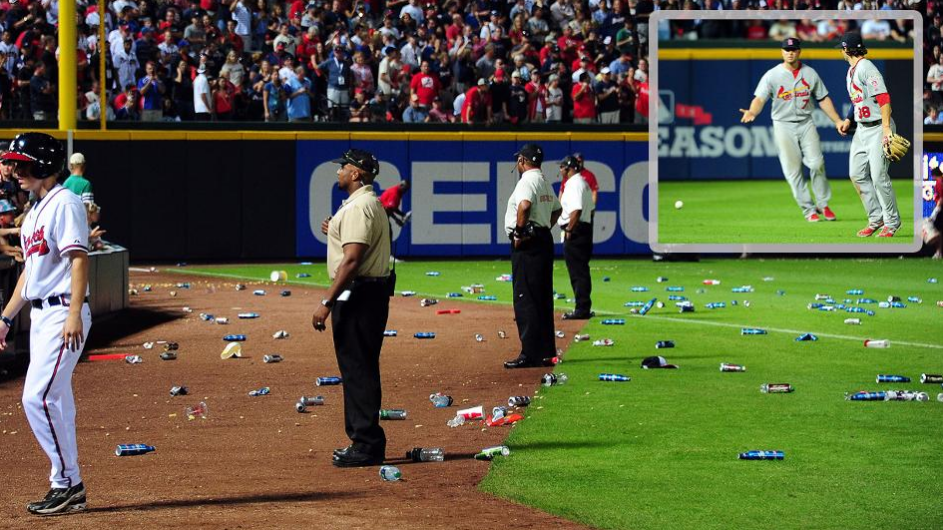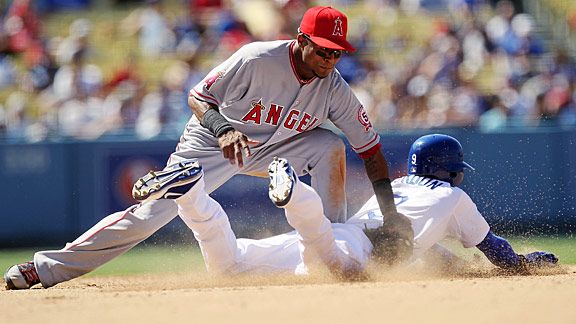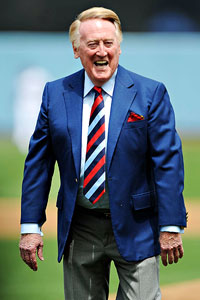It could have been the Dodgers making the big news today. And someday, it will be.
But for now, it’s all Angels.
On Thursday, the Dodgers continue their participation in a bankruptcy court hearing with Fox, a hearing largely focused on how to maximize the value of the baseball team. While that is going on, the Angels signed Albert Pujols and C.J. Wilson — and just like that, the team from Anaheim seems to have written the book on how to maximize franchise value.
The commitment the Angels are making to the 31-year-old Pujols is, for those of us who live in the real world, insane. Ten years, $250 million-plus and all the fringe benefits I suspect you can name. It’s an incredible amount of money.
But the reason the Angels are able to make such a long-term splurge relates to the same reason that Dodgers fans should have hope for the franchise after all the courtroom drama is over. The TV money coming into the Southern California baseball market, whether from Fox Sports or its newly emerging rival, Time Warner Cable, is out of this world.
As Richard Sandomir recently wrote in The New York Times, the Dodgers’ current TV rights deal with Fox calls for just less than $40 million in its final year, 2013. In the next contract, the annual payment the Dodgers receive in TV revenue is expected to be, at the bare minimum, $150 million, and quite possibly will go north of $200 million. Sandomir even calculates that $300 million per year is a believable figure when all the bidding is done.
I’m not one to use the word “game-changer” frequently, but that’s a game-changer.
There are two principal reasons for the soaring dollars. Live sports has become invaluable programming for broadcasters in a DVR age that has brought declining ratings to conventional TV programming. And as I wrote for Variety this week, with TWC taking the Lakers from Fox to start new cable channels dedicated to the NBA team, the Dodgers are more valuable because of the need to fill the cable programming schedules in the summer months.
What’s relevant to Thursday’s signings is that the Angels are hardly being left out of the TV party. The Los Angeles Times reported in October that the Angels were close to negotiating an extension of their current TV deal with Fox, one that already stood to pay them more than the $80 million per year that Fox agreed to pay the Texas Rangers last year. Although you wouldn’t have assumed the Angels would get quite what the Dodgers could count on, the marquee value of Pujols — the equivalent of signing a saner, younger Manny Ramirez — certainly will help. You can make a direct argument that the appeal of Pujols and his effect in boosting the Angels’ win total will only help the team draw more TV money as negotiations are finalized.
When you consider the probability that the Angels will be getting more than $1 billion from Fox over the life of Pujols’ contract, then absorbing those final $25 million-a-year seasons or whatever they are, even after he’s over-the-hill, doesn’t seem so vexing. Pujols is sponge-worthy, and the Angels are going to have a lot of sponges.
That the Dodgers know they have the same revenue potential, if not more, reminds us how easily the team could have been a major player in this winter’s free-agent market. Heck, even under a normal budget, we already knew the Dodgers could have figured out a way to afford Prince Fielder (probably a better fit for the team than Pujols because he’s younger and not demanding a 10-year deal).
Eric Stephen of True Blue L.A. reiterated the point this week. If you combine the salaries of Aaron Harang, Juan Rivera, Chris Capuano, Mark Ellis, Jerry Hairston Jr. and James Loney, you would basically have the money to sign Fielder and a starting pitcher. Then you play bargain ball at second base, and you still probably have a better team than what the Dodgers will put out in 2012.
Factor in the Dodgers’ post-2013 TV money and a new owner with deeper pockets, which will come regardless of how the current bankruptcy hearing plays out, and it’s really no sweat. A contract the size of the one Pujols is getting makes me uncomfortable — except when I remind myself just how different the financial landscape will be for the Dodgers in the coming years.
Nothing the Angels did Thursday guarantees them a World Series title — and more often than not during the next 10 years, the team that does win the Series will not be Pujols’ team. My point is not that the Pujols signing is a great one, but that it’s a feasible one. Over the life of the contract, taking into account both his peaks and his valleys, Pujols should make the Angels a better contender for titles and TV viewers. Even at Pujols’ astronomical salary, the Angels’ risk-reward ratio is a solid one. Adding Wilson to the party only underscores this point.
And it serves as a reminder that anyone looking to acquire the Dodgers or their TV rights would be more confident in doing so knowing that Matt Kemp, Clayton Kershaw and a player of Pujols’ or Fielder’s caliber is in place. (And hey, Fielder is still out there …)
So take heart, Dodgers fans. Frank McCourt is still selling, and the TV dough is still coming. This time next year, the Dodgers should be in the money, and we’ll have to worry (sigh) only about whether they’re spending it wisely.






